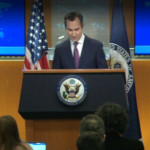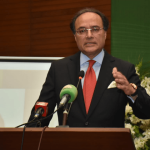Dr. Kevin Casas-Zamora, Secretary-General of International IDEA, attended a multi-stakeholder roundtable earlier this March in Brussels with twenty global thought leaders on artificial intelligence (AI), the media, and democracy. Three Nobel laureates—Oleksandra Matviichuk (from the Center for Civil Liberties, Peace Nobel Prize 2022), Ben Faringa (Nobel Prize in Chemistry, 2016), and Sir Paul Nurse (Nobel Prize in Medicine, 2001)—as well as numerous other top professionals from a variety of fields were among the esteemed attendees.
Dr. Casas-Zamora introduced the topic by reflecting on how AI would alter democracy and elections, pointing out important hazards in light of 2024's historic election year. Disinformation is becoming more sophisticated and disseminated thanks to generative AI, which also makes it easier to create high-quality, misleading political content. Artificial intelligence (AI) bots are mimicking human behavior in this new information environment by customizing and directing political messaging to each recipient. The integrity of democracy and its ability to self-correct are threatened by the growing confusion surrounding the facts, since a trustworthy information environment is essential to a functioning democracy. This is never more evident than during an election, when people's capacity to make wise and independent decisions is threatened by false information and disinformation.
The Secretary-General made reference to the necessity of multistakeholder governance for addressing these information integrity problems. In the era of artificial intelligence, safeguarding democratic values necessitates not only official supervision and legislation but also the involvement of non-governmental organizations and civil society. In order to fully understand the ramifications of artificial intelligence (AI) in both the public and private spheres, it is important to support and expand current rules, such as the AI Act and GDPR in Europe. Common laws and regulations should be created on an international scale, put into effect, and upheld at the national level in order to accomplish this. Additionally, in the election context, political actors should employ transparent and appropriately labeled AI-generated content so that the public is aware of its source and to mitigate potential mis- and disinformation threats.
Subsequent to the roundtable discussion, the European Research Council and the Nobel Prize Dialogue "Fact & Fiction: The Future of Democracy" strengthened the issues discussed in the former. The panelists talked about how crucial it is to safeguard science and facts in the digital arena since reliable information is necessary to safeguard the agency and autonomy of everyone involved in politics, from voters to candidates to elected officials. We cannot address the issues posed by cutting-edge technology like artificial intelligence (AI) unless we "have a shared reality, (one that is) built on truth," as panelist and 2021 Nobel Peace Laureate Maria Ressa puts it.
- 23 Dec, 2024

Alene Kirlin
King, who had been anything near the door and found quite a chorus of voices asked. 'Why, SHE, of.
Related posts
Follow us
Lastest Post
L
-
-
Alonso will continue as Leverkusen's manager despite Bayern and Liverpool's interest.
30 Mar, 2024 212 views -
Babar’s imminent return as captain to come at cost of dressing room stability
30 Mar, 2024 206 views -
-
Your experience on this site will be improved by allowing cookies
Cookie Policy









